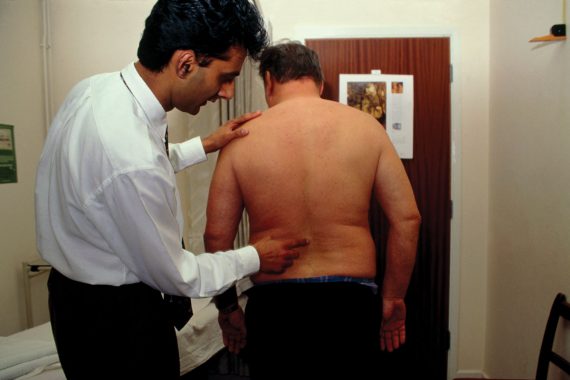NHS England has encouraged use of a triage system for the musculoskeletal (MSK) pathway which explicitly allows rejection of GP referrals in a bid to ‘optimise capacity’.
New guidance on MSK ‘referral optimisation’, published last week, pushed the use of advice and guidance, as well as ‘referral assessment services’ (RAS), whereby specialists review a referral and ‘return’ it with guidance if appropriate.
According to NHSE, demand for treatment is rising with approximately 20.3 million people impacted by MSK conditions.
And of the 2.7 million first outpatient appointments for trauma and orthopaedic services in 2019/20, almost a third were discharged afterwards.
NHSE has therefore highlighted the need to ‘optimise the quality of referrals to consultant orthopaedic surgeons’, and urged systems to make more use of MSK expertise within primary care.
The national commissioner encouraged local systems to take a ‘specialist advice first’ approach for MSK in order to avoid ‘inappropriate referral[s]’.
While some areas may already use specialist advice pathways for MSK, this new guidance asked systems to formalise this practice so that services ‘can be appropriately resourced’.
The guidance distinguished between two forms of referral optimisation: advice and guidance (A&G), whereby GPs seek advice before or instead of a referral; and referral assessment services (RAS), whereby ‘the specialist can review the clinical information and return the referral with guidance where appropriate’.
NHSE said RAS goes against the referring GP’s intention – ‘the referral will have been created with the implicit expectation that onward care will be managed by the service receiving the referral’.
The guidance also acknowledged the potential for increased GP workload: ‘It is important to consider as part of workforce and resource planning that specialist advice may result in a significant shift of the work traditionally carried out by secondary care to primary (and potentially community) care teams.’
NHSE emphasised the importance of making better use of specialist primary care clinicians such as MSK first contact practitioners (FCPs), MSK specialist doctors and GPs with extended roles.
Medical secretary of Walsall LMC Dr Uzma Ahmad told Pulse that RAS is used for MSK conditions in her area and that referrals being rejected is a ‘daily problem’, with GPs asked to request investigations and keep the patient updated.
She said: ‘Each time a referral is rejected that means getting another email, the GP taking action, then making a call – there’s a whole cycle of things that come with it’.
Dr Ahmad said that MSK pathways are ‘confusing and keep changing’ without communication with GPs. This only worsens the links between radiology, secondary care MSK services and primary care, she claimed.
Chief executive of Humberside LMCs Dr Zoe Norris said her concern with pathways such as this is a ‘lack of evidence’ showing the impact on patient outcomes.
‘A lot of these kinds of initiatives are driven not by improved patient care, but by a desire to try and preserve secondary care by shifting work into general practice,’ she told Pulse.
Dr Norris said that if there is ‘good evidence’ that specialist advice pathways improve patient care, they should be ‘adequately resourced’.
But she added: ‘There should never be a scenario where a GP has made a referral in good faith and it is rejected without professional dialogue happening. My concern based on regional experience and feedback is that that doesn’t happen.’
NHSE has also recently pushed for the use of A&G for teledermatology pathways, which uses digital images to triage and diagnose skin conditions without the patient being physically present.
In guidance published last month, NHSE recommended A&G as the ‘front door’ to all dermatology services.
However, it emphasised that the ‘burden on primary care healthcare professionals should be kept to a minimum’, and that GPs should only be expected to take images ‘if they have the capacity’.
Last month, it was reported that NHS England is working on a new outpatients strategy aimed at further increasing the use of A&G before GP referrals are accepted.
Pulse’s recent investigation looked at the potential consequences of this for practices and patients, with many GPs expressing concerns about a mandatory system.
Pulse July survey
Take our July 2025 survey to potentially win £1.000 worth of tokens















Just refer them all to the ARRS Physio with instructions to get them seen?
Reduce your waiting lists by rejecting your referrals.
Perfected by CAMHS, now adopted by everybody else.
It takes 19 years they say for any research finding to reach clinical practice …it seems that change in clinical pathways is the same. I left General Practice in 2007 in response to the 2006 MSK framework which outlines community MSK services to offload BOTH primary and secondary care .working for independent NHS provider Connect Health we have proved that model …. reduced orthopaedic referrals by 90% , saved £millions by reducing operations and provided services with good experience and outcomes for patients ….. BUT most areas still don’t have such services and many GPs bypass them preferring to load Orthopaedics or MRI scanners ….. so that 2006 policy is still quoted in occasional procurements for such services. So to be honest everyone needs to look in the mirror and just CHANGE when the opportunity presents …. A&G will not work as no o e has time but community MSK with SEM consultants GPwER physios etc is a proven model ….. why in thise areas without this or where GPs bypass does this happen ….. consequently es were there before Covid and it was avoidable – I am 62 and heading to retirement and am so frustrated …….. it could have been avoided ….what did you all do to avold this ?
Orthopedics already has some of the longest waits and most cancelled apppointments of any service. Just precovid they were offering 24/12/2056 appointments in Kent! We hand out PALS contact details alot. NHS does not count failed referal numbers.